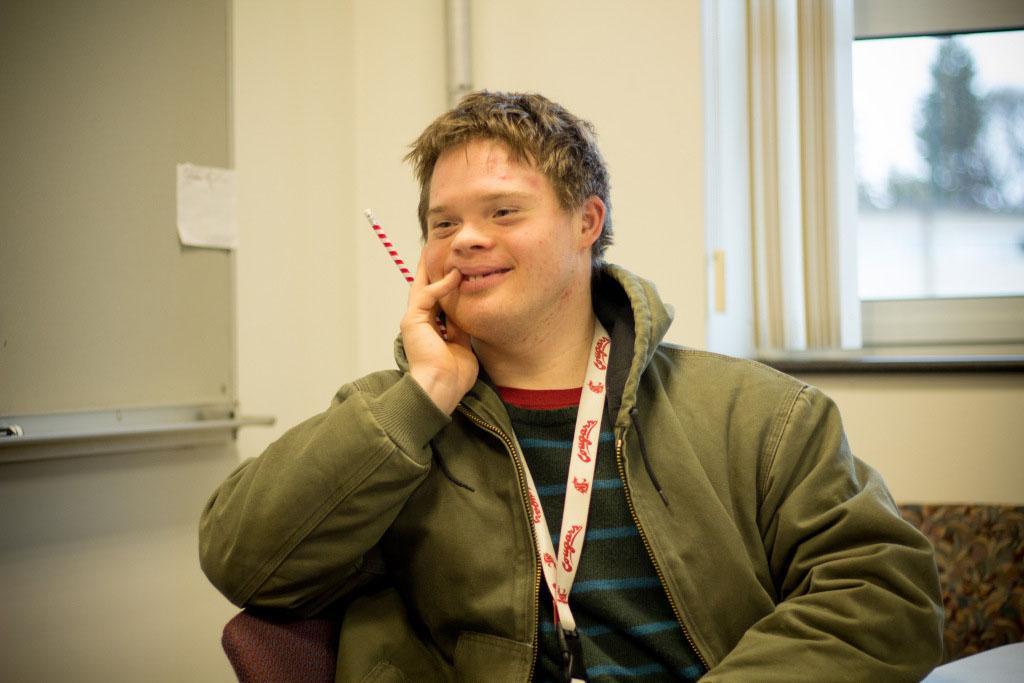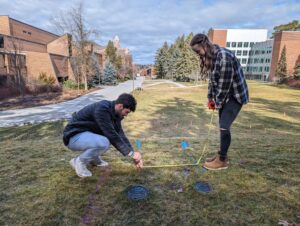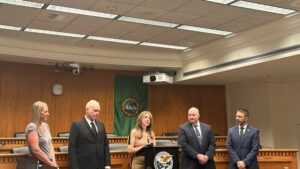PULLMAN – Evan Henniger always felt drawn to Washington State University.
His parents never thought college would be a possibility. Evan, 20, was diagnosed with Down syndrome shortly after his birth, and the prospect of venturing away from home on his own seemed unlikely.
That changed last year when WSU launched a special education program for college-age students with educational or developmental disabilities. The Henningers’ wish for Evan suddenly came true.
“You could have knocked us over with a feather,” Lisa Henniger said. “That has been our dream since the day Evan was born, and we’ve been lowering our expectations to what we thought was reality (for Evan) to go to college, and then we found out that this program could start up. It was truly a dream come true.”
Evan recently finished his first semester at the university, taking classes and working at an internship on campus. With the help of his cousin – a graduate student at WSU – Evan has become more independent than his parents could have imagined.
In just a few months, the Responsibility Opportunities Advocacy and Respect (ROAR) program has opened a multitude of opportunities for Evan and three other students in its inaugural class. The two-year program, which is operated by the College of Education, provides life skills and health education for students, who can also audit college courses and work in internships on campus. Participants or their families pay tuition and fees but are eligible for financial aid.
From casual conversation to a new program
Brenda Barrio, the program’s interim director and an assistant professor with the College of Education, had long wanted to develop a special education program on campus.
The majority of students with intellectual disabilities often struggle to adapt to society after leaving the K-12 system, Barrio said. Only 14 percent of individuals with intellectual disabilities are employed in the U.S., she said.
“Most of them are not able to obtain jobs because there are not enough opportunities, or because they do not have the skills or training to do so,” Barrio said.
Other four-year universities across the country already had created similar programs. Barrio believed WSU possessed the existing infrastructure to mold a suitable curriculum.
“With Pullman being so small, and the university being so big, and having so many opportunities for internships, we thought that this was the perfect place to do something like this,” Barrio said.
Because the university was cutting budgets in many programs, Barrio looked to donors. It took more than a year and a half of fundraising coupled with university promotions to gather enough funding to launch the program.
Eventually, ROAR was accredited as a federally approved Comprehensive Transition Program aimed at providing students with intellectual disabilities access to either classes on campus, housing or internships. From there, Barrio got the go-ahead from WSU.
Barrio said the two main goals of the ROAR program are to allow students to continue their education while living independently and working toward a career.
For Evan and the three other students enrolled, this includes going to class, living together in designated apartment units and possibly participating in internships.
Barrio wants to expand ROAR’s enrollment to 10 students for the fall semester.
“This has honestly been one of the coolest things that I’ve ever done in my life,” she said.
Family connection helps ease transition
The Henninger family had similar feelings.
Evan’s family has 15 aunts and uncles, eight cousins, three grandparents, two older sisters and a mom who attended WSU. In many ways, Evan is just the next in a line of WSU students.
For Mike and Lisa Henninger, of Bellingham, the prospect of sending their son across the state was daunting. Now, months later, they say the program has allowed Evan to become more independent and confident.
“The other day, he said they had a leak in the toilet, so he called maintenance,” Lisa said. “My other kids would have called me first to figure out what to do. But Evan, he figured it out on his own.”
Shortly after Evan received his acceptance letter, his cousin, Jayson Gibb, was accepted into a sports management master’s program at WSU’s College of Education. The two share a close bond. At the center of their relationship is a passion for WSU sports.
“Throughout the family, I could not think of a bigger Cougars fan than Evan,” said Gibb, a graduate assistant strength and conditioning coach for WSU Athletics. “It doesn’t matter what sport was going on, Evan was always updating and checking in, making sure there was a TV around or a radio on that we could definitely listen in to.”
At the beginning of the semester, a professor reached out to Gibb, asking if he knew of any internships within the athletic department. A student in the ROAR program was interested, the professor said. Sure enough, it was Evan.
From there, Evan worked with the WSU soccer team in various roles. He assisted the equipment manager in setting up pregame warm-ups, observed team workouts with the strength and conditioning coaches, and met players and coaching staff.
The coolest part of the experience for Gibb was seeing faculty members advocate for Evan.
“They were going out of their way to help Evan find an internship,” Gibb said. “They wanted to see him get an internship within athletics, and they knew I was a graduate assistant within athletics. This opportunity just shows how community-based Washington State truly is.”
Gibb has seen Evan’s level of independence grow dramatically. At the start of the semester, Evan frequently messaged Gibb with questions. Now, those phone calls and text messages have steadily decreased.
“He’s cooking for himself,” Gibb said. “Evan can eat a bunch, but he’s kind of understanding (how to balance). I tell him, ‘ OK, maybe let’s have soda once a week.’ I always check in with him, kind of have a little joke going with that. But he’s learning to become very independent.”
On a Friday in late November, Evan went to Bohler Gym to visit the athletic offices and talk with a reporter about his experiences with ROAR. He had no idea that Gibb was going to join in on the interview.
As Gibb walked in the door, Evan’s face lit up with a smile and he yelled, “Jayson!” Evan smiled as the two swapped stories about their families, reunions and shared memories.
One of Evan’s favorite spots on campus is Gibb Pool, named after his great uncle. Evan, who swam in the 2017 Special Olympics, takes a weekly swimming class. Jayson noted that Evan is a “heck of a swimmer.”
This semester, Evan took one sports management class – it does not count for academic credit – and two mandatory ROAR program classes in life skills and health.
Evan is looking forward to taking another round of classes next semester through the ROAR program. He expects to finish the program in May 2020. When he does, he will receive a certificate provided by the U.S. Department of Education.
At the same time, Jayson will earn his master’s degree in sports management education. The cousins will add two links to a long line of WSU heritage when they graduate together.
Gibb said ROAR brought him and Evan, and their entire families, closer together. Gibb and the Henningers intend to stay involved with the program after Evan graduates.
“To be able to have both aspects and what I’ve seen them do in the events I’ve been at for these kids and families, it’s something I want to continue to support throughout the years,” Gibb said. “It’s something I truly believe in and I want more kids to have this opportunity.”
















